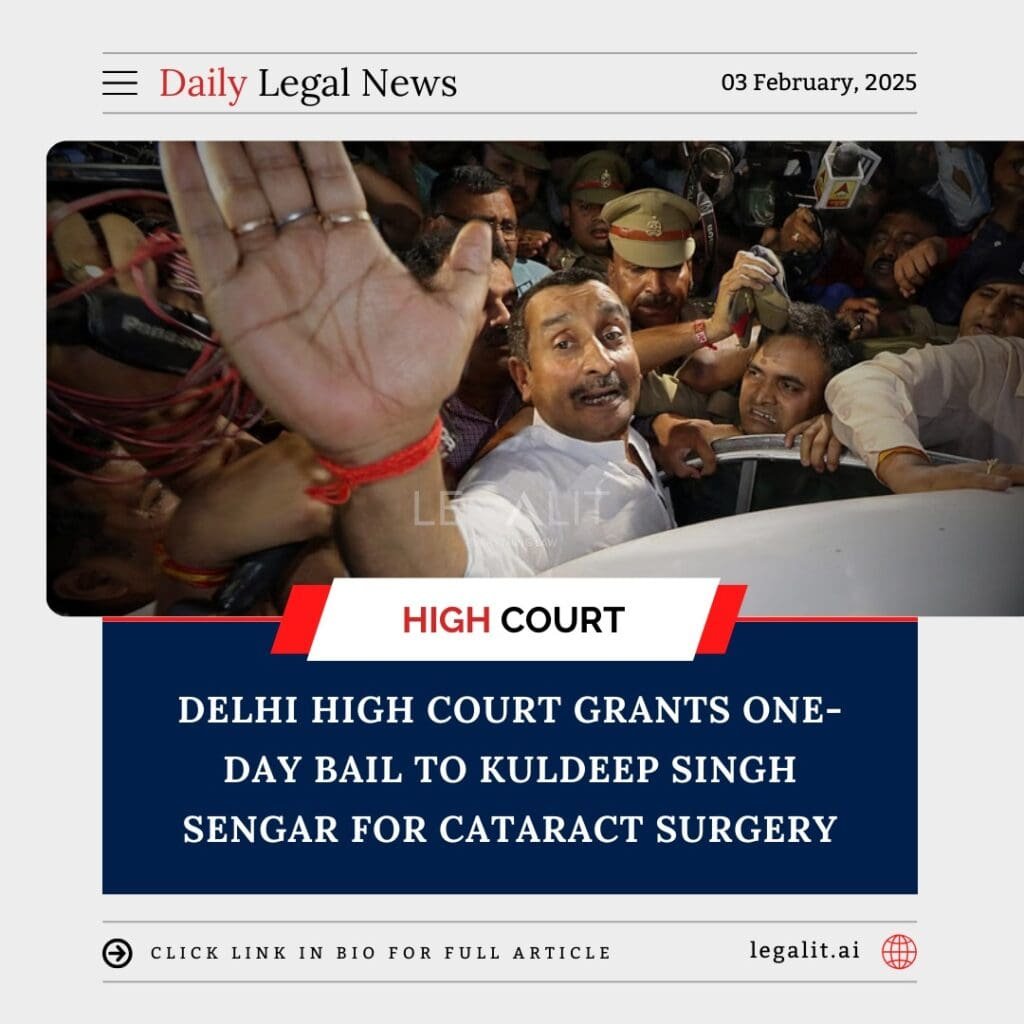
Background
In a significant development, the Delhi High Court granted one-day bail to Kuldeep Singh Sengar, the former Bharatiya Janata Party (BJP) lawmaker convicted for his involvement in the 2017 Unnao rape case. The bail was granted to allow Sengar to undergo cataract surgery, following his request citing health concerns. The former politician had been serving a life sentence after being convicted for raping a 17-year-old girl in Unnao, Uttar Pradesh.
The Court, while considering the bail application, emphasized the humanitarian grounds for granting temporary relief to Sengar for his medical treatment, despite his ongoing conviction and the serious nature of his crimes. This order has sparked discussions, given Sengar’s controversial background and the sensitivity of the case, where the victim’s family has faced significant hardships.
Court’s Decision and Reasoning
- Health Concerns:
Kuldeep Singh Sengar’s legal team presented a medical certificate stating that the former lawmaker was suffering from cataracts in both eyes, which required immediate surgery. The medical report indicated that delaying the procedure could result in irreversible damage to his eyesight. The Delhi High Court considered these health concerns while granting bail, acknowledging that it was a matter of urgent medical necessity. - One-Day Bail:
The Delhi High Court’s order allowed Sengar to be granted one-day bail for the sole purpose of undergoing surgery and receiving necessary post-operative care. The bail is subject to specific conditions, including the requirement that Sengar report back to the authorities immediately after the treatment and that the temporary release will not be extended. - Ensuring Security:
The Court directed that appropriate security measures be put in place during the period of Sengar’s temporary release. This includes the presence of security personnel to ensure that there is no risk of Sengar fleeing or attempting to influence any witnesses or the ongoing legal proceedings.
Legal Context and Concerns
- Nature of the Crime:
Sengar’s involvement in the Unnao rape case has been widely condemned, and his conviction drew national attention to issues of sexual violence and abuse of power. His case highlighted the challenges faced by sexual assault survivors, particularly when powerful political figures are involved. The victim, who was also involved in a car accident allegedly orchestrated by Sengar’s associates, continues to face immense hardships, with her family calling for justice. - Public and Legal Reactions:
The decision to grant bail, even for a single day, has raised concerns among legal experts and activists. Many argue that such temporary relief could set a concerning precedent for those convicted of heinous crimes. Critics argue that the focus should be on the victim’s rights and the severity of the crime, rather than offering a reprieve based on health issues. Supporters of Sengar’s temporary release, however, have pointed out that the law allows for bail in exceptional cases, including for medical treatment. They argue that the humanitarian grounds should be prioritized in situations where health complications can severely affect an individual’s well-being. - Bail for Convicted Individuals:
While the legal framework allows for temporary bail in cases where health conditions warrant medical attention, the decision to grant such bail raises questions about the fairness of such decisions when public sentiment strongly opposes any leniency towards individuals convicted for serious crimes like rape. Legal experts suggest that this move may stir a debate about the need for reform in bail provisions, particularly in high-profile criminal cases.
Broader Implications
- Legal Precedents:
The Delhi High Court’s decision, while based on medical grounds, may have long-term implications for the handling of cases involving convicted individuals, especially those convicted for grave offenses. It raises the question of whether such concessions should be extended in cases involving powerful and politically influential individuals. - Focus on Victim’s Rights:
The decision also brings attention to the need to focus on the rights and well-being of victims in such cases. Activists and survivors’ groups continue to push for stronger measures to ensure justice and security for victims and their families, especially when the accused hold influential positions in society. - Public Sentiment and Justice System:
The Unnao rape case, like many others involving high-profile political figures, underscores the tension between legal procedures and public sentiment. The high court’s decision to grant bail is likely to draw mixed reactions, especially given the serious nature of Sengar’s crimes and the long-lasting impact on the victim and her family.
Conclusion
The Delhi High Court’s order to grant Kuldeep Singh Sengar one-day bail for cataract surgery has raised critical legal and ethical questions about the treatment of individuals convicted of heinous crimes. While the Court’s ruling was based on medical grounds, it underscores the importance of balancing humanitarian considerations with the pursuit of justice for victims of crimes. The decision could have broader implications for the handling of similar cases in the future, particularly in high-profile political or criminal matters, where the interests of victims and public sentiment must be carefully weighed against the legal rights of the accused. The victim’s family and supporters continue to call for justice, hoping that the legal system prioritizes their rights and ensures that perpetrators are held fully accountable.